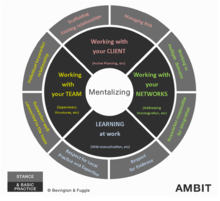Adolescent mentalization-based integrative treatment
Adolescent mentalization-based integrative treatment (AMBIT) is a novel adaptation[1] (by Dickon Bevington, Peter Fuggle, Peter Fonagy, Eia Asen, Mary Target, Neil Dawson and Rabia Malik) of the theory of mentalization and practices of mentalization-based treatment to address the needs of chaotic, complex and multiply comorbid youth, via team-based (predominantly outreach) multimodal practices.[2]

These practices, shaped by an eightfold principled therapeutic stance and using mentalization as the integrating framework, balance the development of a strong therapeutic attachment to a key worker with strong peer-to-peer relationships between workers that are designed counteract the potential for destabilizing effects from such intense work.[3]
Mentalization is applied and fostered in three directions in AMBIT:
- Towards the young person and their family/carers.
- Towards colleagues and peers.
- Towards the wider multi-agency network.
In addition a range of manualized 'barefoot' adaptations of existing evidence-based treatment modalities are available to workers, and the approach encourages the development of a "learning organisation" stance (see the work of Peter Senge) within local teams, including the promotion of constrained local adaptation to create specific implementations that offer a "fit" for local cultures and service ecologies. This is supported by the innovative (active) approach to "treatment manualization".
Treatment manual
AMBIT deploys a novel open-source wiki-based approach to treatment manualization[4] based on TiddlyWiki and TiddlySpace that allows multiple teams to develop their own locally adapted versions of a common core of AMBIT material. Drawing on developments in programming, the authors have described the approach as an "open source approach to therapy".
Implementations
As at April 2014, eighty teams around the UK have been trained in AMBIT by the AMBIT project based at the Anna Freud Centre charity in London, as well as teams in Switzerland and the USA. Encouraging early outcomes evaluative evidence has been published,[5] but as a novel approach there are as yet no completed randomised controlled trials.
Independent reviews, awards and sponsors
AMBIT is described in independent reviews by the Youth Justice Working Group (2012),[6] the Centre for Mental Health, 2010.[7] and in a literature review on integrative psychotherapy for children and adolescents by Krueger and Glass.[8]
The AMBIT Collaboration was awarded the "Innovation Nation" award for Innovation in Collaboration from The Guardian newspaper and Virgin Business Media in 2012.[9]
AMBIT has been supported by grants from Comic Relief, the City Bridge Trust and the James Wentworth Stanley Memorial Fund.
References
- ↑ Bevington D, Fuggle P, Fonagy P, Asen E and Target M (2012) "Adolescent Mentalization-Based Integrative Therapy (AMBIT): A new integrated approach to working with the most hard to reach adolescents with severe complex mental health needs." CAMH Journal (published electronically May 4, 2012 | DOI: 10.1111/j.1475-3588.2012.00666.x)
- ↑ Asen, E. & Bevington, D. (2007): Barefoot practitioners: a proposal for a manualized, home-based Adolescent in Crisis Intervention Project. In: Baruch, G., Fonagy, P. & Robins, D. (eds): Reaching the Hard to Reach. John Wiley, Chichester – an early description of the model, with less emphasis on the organisational elements.
- ↑ Bevington D, Fuggle P (2012) Supporting and enhancing mentalization in community outreach teams working with socially excluded youth: the AMBIT approach. In "Minding the Child: mentalization-based interventions with children, young people and their families." Ed. Midgley N and Vrouva I, Routledge, 2012.
- ↑ manualization
- ↑ Fuggle, P., Bevington, D., Cracknell, E., Hanley, J., Hare, S., Lincoln, J., Richardson, G., Stevens, N., Tovey, H., Zlotowitz, S. (2014) The Adolescent Mentalization-based Integrative Treatment (AMBIT) approach to outcome evaluation and manualization: adopting a learning organization approach. Clin Child Psychol Psychiatry March 3, 2014
- ↑ Rules of engagement: Changing the heart of youth justice. A policy report by the Youth Justice Working Group, January 2012 (see page 101.) http://www.centreforsocialjustice.org.uk/client/downloads/CSJ_Youth_Justice_Full_Report_WEB%20%282%29.pdf[]
- ↑ You just get on and do it: healthcare provision in Youth Offending Teams (2010) Lorraine Khan and Jane Wilson. Centre for Mental Health. (see p.31) "Archived copy" (PDF). Archived from the original (PDF) on 2013-11-05. Retrieved 2012-09-09.
- ↑ Krueger, SJ, and Glass, CR (2013) "Integrative Psychotherapy for Children and Adolescents: A practice-oriented literature review" Journal of Psychotherapy Integration, 2013, no.4, 331–344
- ↑ "Innovation Nation Awards – Winners". London: The Guardian. 31 May 2012. Retrieved 7 September 2012.